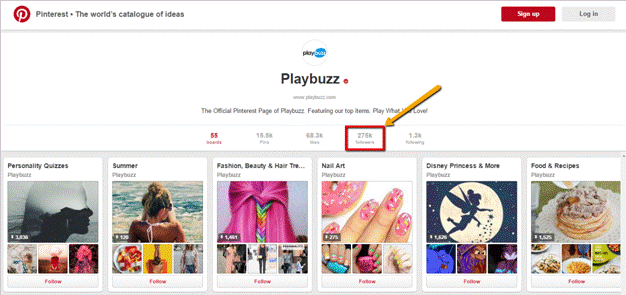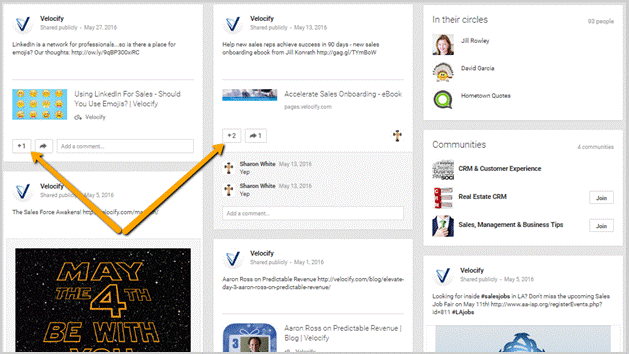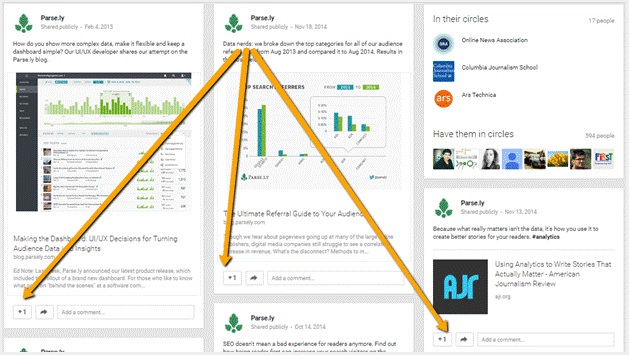That study yielded some pretty interesting, albeit expected results. Facebook and Twitter were particularly popular, while LinkedIn and Pinterest didn’t find much favor. Instagram was limited to fashion startups and Google+ was largely dead.
This made us think: how do B2B startups use social media? Are there any differences between B2B and B2C startups? If yes, what are these differences?
To find answers, we analyzed how 50 venture-backed companies in the B2B use social media.
The results were equal parts expected and surprising.
Our Process
As before, we followed a simple process in our analysis:
- We searched for B2B startups founded after 2015 in the Crunchbase database.
- To filter out startups listing themselves on Crunchbase for SEO purposes, we only looked at venture-backed startups or startups that had raised an angel round at the very least.
- From this list, we picked out 50 startups at random and analyzed their social media use.
We limited our analysis to the top 6 social networks – Facebook, Twitter, Instagram, Pinterest, LinkedIn, and Google+. We skipped Snapchat since it doesn’t really have a lot of uptake among B2B companies right now.
Our data looked like this at the end:

Notice the series of “NAs” under the Instagram column?
That’s not an accident – very few B2B businesses we analyzed were on Instagram, as expected.
Let’s take a look at some other top findings from this analysis.
Most B2B startups prefer Twitter, Facebook, and LinkedIn; Pinterest, Instagram and Google+ are widely ignored
This shouldn’t come as a surprise to anyone: B2B startups are concentrated mostly on business-friendly platforms like Twitter and LinkedIn.
Facebook gets a lot of traction as well, but that’s mostly because of Facebook’s massive reach.
Pinterest and Instagram, as expected, find few takers.
Here are the numbers:
| Social Network | Total Followers Across All Startups |
| 2,546,292 | |
| 450,045 | |
| 276,807 | |
| 67,183 | |
| 11,560 | |
| Google+ | 10,237 |
You’re obviously thinking that Facebook has a substantial lead over all other networks, but that’s mostly because of a single startup – PlayBuzz – which has a massive 2.4M fans on Facebook. PlayBuzz is a hybrid B2B/B2C startup that offers quiz creation tools to publishers but also publishes quizzes of its own, which gives it this massive reach.
PlayBuzz similarly skews Pinterest numbers. This single account has over 274,000 followers.
LinkedIn is the most popular platform among B2B companies
100% of the startups we surveyed had a LinkedIn presence (even though the lowest ranked startup – in terms of followers – had just 3 followers on LinkedIn).
Similarly, 96% of the startups we surveyed (or rather, 48 out of 50) use Twitter to keep their audience updated.
In contrast, only 40 out of 50 surveyed companies had a Facebook presence. For Instagram, this was much higher with only 12 out of 50 companies maintaining a presence on the platform.
For Pinterest and Google+, these numbers were 14 out of 50 and 35 out of 50 respectively.
| Social Network | Total Startups with Active Profiles (out of 50) | % of Total Startups with Active Profiles |
| 40 | 80% | |
| 50 | 100% | |
| 48 | 96% | |
| 12 | 24% | |
| 14 | 28% | |
| Google+ | 35 | 70% |
A couple of things to note:
- A lot of Google+ profiles are empty or haven’t seen updates in months. Most of these profiles were likely created because of YouTube or Google Apps. So while on paper, Google+ is more popular than Pinterest and Instagram (35 out of 50 vs. 14 out of 50 users), this doesn’t translate into actual use.
- Similarly, a lot of Facebook business pages are scarcely utilized. Twitter profiles, on the other hand, are frequently updated with fresh content.
B2B startups have the highest median follower count on Twitter and LinkedIn
Looking at the median follower count for each startup and social network is much more illuminating than simply looking at the average or total follower count. This eliminates the outliers who often account for a disproportionately high number of followers.
For our B2B startups, the median follower count looks like this:
| Social Network | Median Follower Count of Each Startup |
| 955 | |
| 905 | |
| 684 | |
| 529.5 | |
| 67 | |
| Google+ | 40 |
The average looks quite a bit different:
| Social Network | Average Follower Count of Each Startup |
| 9,375 | |
| 1,343 | |
| 63,657 | |
| 963 | |
| 19,771 | |
| Google+ | 292 |
A few things stand out here:
- Startups have a much higher median follower count on Twitter and LinkedIn than on Facebook, even though the total number of followers on Facebook is substantially higher. As mentioned before, this can be attributed to PlayBuzz racking up 2.4M Facebook likes.
- Instagram has a much higher median follower count than Pinterest or Google+. This is again because nearly 99% of all Pinterest followers in our list can be attributed to PlayBuzz (274k out of 276k followers). Instagram may have fewer startups on it, but the ones that are there take the platform seriously enough.
There is no correlation between funding and followers
B2B startups are usually more capital efficient than B2C startups. One analysis by Aileen Lee of Cowboy Ventures found that “enterprise-oriented startups have delivered more value per private dollar invested” as compared to consumer-focused startups.
In the current funding environment, this means that an increasingly larger share of venture dollars are flowing out to B2B startups.
For instance, this study by PitchBook found that from 2014 to 2016, investment in B2B startups increased while the B2C investment market actually shrunk in 2016:

This is reflected in our analysis as well.
Excluding 6 startups with undisclosed funding totals, the 50 startups on our list have raised a total of $554.45M – or nearly $12.5M per startup.
These are the top 10 most funded startups on our list:

Looking at the funding vs. total followers, however, isn’t particularly insightful.
For instance, the startup with the second highest funding total at $59.77M – Magnet System – has just 90 followers on Twitter.
Looking at the top 10 startups with the highest social media followers vs. the 10 most funded startups, we see just 4 startups in common:

Even though an increasingly larger share of B2B buyers research online before making purchase decisions (94% as per one study), a number of our top funded startups haven’t found it worthwhile to invest heavily in social media.
A few reasons why this might be the case:
- Social media isn’t popular among their target decision makers.
- Lack of in-house social media marketing expertise, and/or lack of time/tools to dedicate to social media.
- The product isn’t conducive to social media. For instance, one of the startups on our list – Vascular Graft Systems – manufactures medical grafts. Its target customers of surgeons and hospitals isn’t likely to be looking for solutions on Twitter or Facebook.
Part II: What Kind of Content is Shared
We’ve seen how usage patterns vary across different social networks.
In this next part, we’ll take a look at what kind of content B2B businesses like to share on different channels.
-
On Twitter
Simply Measured has the highest number of followers at 349k:

This is followed by SalesLoft at 10.5k:

That’s a mighty big difference.
The top 10 startups on Twitter looked something like this:
| Startup | Total Twitter Followers | Twitter Handle |
| Simply Measured | 349,000 | @simplymeasured |
| SalesLoft | 10,500 | @salesloft |
| ShipServ | 9902 | @shipserv |
| Parsley | 7906 | @parsely |
| Funding Options | 6484 | @FundingOptions |
| MailJet | 6471 | @mailjet |
| Pixlee | 6154 | @pixlee |
| freee | 5973 | @freee_jp |
| Lattice Engines | 4687 | @lattice_engines |
| Proformative | 4472 | @proformative |
Interestingly enough, with 411,547 followers, the top 10 startups accounted for 91% of the total 450,045 Twitter followers across all 50 startups.

What kind of content is shared?
Companies post more frequently on Twitter than on any other social media. Simply Measured has posted almost 30k posts that have got them 349k followers.
They post anywhere between 10-15 posts on a single day. It could be about news in their niche or even some development at their office.

SalesLoft is no different. They also post dozens of posts in one day and pin a new post every day to give more attention to that tweet.

Takeaways:
- B2B startups that do well on Twitter embrace its free-wheeling, no rules nature. They post often and don’t limit themselves to specific topics.
- Pinning a tweet is a good way to give it more attention.
- News, internal events, advice, blog posts, images – everything is game for Twitter.
-
On Linkedin
Linkedin is the only social channel every B2B company is using in our list. Most of them keep their profile updated with 2-3 posts every week.
SimplyMeasured tops the list with the most number of subscribers followed by Kantox.


These are the top 10 startups on our list in terms of LinkedIn followers:
| Startup | Total LinkedIn Followers |
| Simply Measured | 9758 |
| SalesLoft | 4305 |
| Kantox | 4022 |
| Kapow | 3774 |
| Lattice Engines | 3026 |
| Jifflenow | 2905 |
| Velocify | 2612 |
| Cydcor | 2572 |
| Mintigo | 2360 |
| NuORDER | 1879 |
What kind of content is shared?
Both Simply Measured and Kantox post more business focused stories. Linked is not where you’d want to post memes or a GIF.
Companies also post internship and job offers on their LinkedIn page.


Takeaways:
- LinkedIn is strictly business. For B2B companies, it’s a particularly important channel of customer acquisition. Maintaining a strong presence here is crucial for attracting business customers.
- Besides customer acquisition, LinkedIn’s other big role is in talent acquisition. A strong LinkedIn page gives potential employees a glimpse of your company, its expertise, and its culture. Posting stories about company culture, internal events as well as job openings can be particularly effective.
-
On Facebook
80% of the B2B companies surveyed use Facebook to promote themselves. Playbuzz has the maximum number of likes followed by Free.


Here are the top 10 startups on Facebook in terms of likes:
| Startup | Total Facebook Likes |
| Playbuzz | 2,420,270 |
| Simply Measured | 56336 |
| freee | 26464 |
| Pixlee | 6540 |
| Cydcor | 4621 |
| Lattice Engines | 4330 |
| ShipServ | 3293 |
| Kapow | 2973 |
| Velocify | 2929 |
| Mailjet | 2105 |
Facebook’s median like count per startup is lower than LinkedIn or Twitter. This shouldn’t be surprising to anyone – Facebook’s poor organic reach and constantly changing algorithm means that businesses don’t feel compelled to invest in getting likes.
That doesn’t mean that businesses aren’t actually using Facebook. As per research by CMI, 75% of B2B buyers are Facebook users. This reach, combined with Facebook’s superior ad targeting, means that businesses can use targeted ads to reach their customers.
Why spend on likes when you can simply buy clicks to your landing pages?
What kind of content is shared?
Facebook posts are a mix of all other social media post-types. It’s not as open-ended as Twitter but it isn’t as business-like as LinkedIn either.
As expected, there is a lot of visual content.
For example, SimplyMeasured posts videos, photos of their office and also the company and industry news.

Freee, which sells accounting software, links out to its blog posts as well (the pages are translated from Japanese).
Takeaways
- Facebook is a great way to humanize your brand. Sharing “behind the scenes” content, office pictures, internal events photos, etc. can be powerful branding and recruiting tools. Nearly all of your would-be customers and employees will likely be on Facebook anyway.
- Visual content dominates Facebook. GIFs, images, videos – anything besides a standard text post will help you reach a bigger audience.
-
On Instagram
Instagram is mostly ignored by B2B companies. Only 12 out of 50 use Instagram.
Playbuzz has the most number of followers followed by Cydcor.


Here is the Instagram top 10:
| Startup | Total Followers on Instagram |
| Playbuzz | 5461 |
| Cydcor | 1559 |
| Simply Measured | 1428 |
| NuORDER | 885 |
| Kapow | 734 |
| SalesLoft | 584 |
| High Alpha | 475 |
| Handshake | 225 |
| Velocify | 104 |
| Newtopia | 55 |
| Balluun | 35 |
What kind of content is shared?
Cydcor shares a lot of pictures and short videos from work on Instagram:

PlayBuzz, meanwhile, mostly shares memes. Fitting given its hybrid B2B/B2C model.

Both the companies don’t miss out on a chance to use relevant hashtags


Takeaways:
- Instagram isn’t a great platform to acquire actual customers. Its traffic is too far up in the funnel to convert into leads without significant effort. However, Instagram is a great branding and recruiting tool, especially if your business wants to target younger talent.
- Sharing behind-the-scenes images and brand-focused pictures is a great way to use Instagram’s reach for branding and recruiting.
- Since Instagram won’t likely net you leads directly, it’s recommended that you keep it out of your marketing mix until you’ve exhausted all other social channels.
-
On Pinterest
Pinterest is used by only 14 out of 50 companies from the list – fitting for a B2C focused startup.
The top performing one is PlayBuzz, an online content publishing platform. They have 275,000 followers.
However, because of its hybrid B2B/B2C model, PlayBuzz is an outlier. Other startups on our list have just 310 followers on average.

The others in the top 10 are:
| Startup | Total Followers on Pinterest |
| Playbuzz | 274000 |
| Simply Measured | 1900 |
| SalesLoft | 194 |
| Newtopia | 187 |
| Cydcor | 171 |
| Kapow | 168 |
| Balluun | 90 |
| Mailjet | 44 |
| NuORDER | 32 |
| Talentory | 9 |
What kind of content is shared?
SimplyMeasured has 14 boards with 205 pins covering marketing topics and images.

Given SimplyMeasured’s social media heavy target audience, this makes for great marketing content.
Besides tips, SimplyMeasured also shares images from company events, such as this board:

There are also boards showing off a “day in the life” of a SimplyMeasured employee, along with boards with short team biographies:

Additionally, SimplyMeasured shares a lot of its tweets automatically. This isn’t really ideal but when you’re short of resources, it can get you at least some traction.
Takeaways:
- Again, Pinterest’s audience skews younger and more female. This traffic is likely to be very high up in the funnel to be actually lucrative. It’s best to use Pinterest as a branding and recruiting tool.
- Automate sharing on Pinterest from your more used platforms if necessary. This will ensure that you have a presence on the platform without spending too many resources on it.
-
On Google+
Most of these companies do have Google+ page but with zero recent updates.
This shouldn’t come as a surprise – Google+ is largely a ghost town with just 1% of Google’s actual users active on it (although the claims vary).
PlayBuzz and SimplyMeasured top the list with 2,642 and 2,545 followers respectively.


The top 10 looks like this:
| Startup | Total Followers on Google+ |
| Playbuzz | 2642 |
| Simply Measured | 2451 |
| Velocify | 2044 |
| Parsely | 594 |
| Traxpay | 486 |
| Mailjet | 386 |
| freee | 287 |
| Proformative | 254 |
| Funding Options | 185 |
| BellaDati | 173 |
What kind of content is shared?
Velocify posts one post every week on Google plus. Doesn’t matter how attractive they make the headline they get little to no engagement from the users.

Parsely use to post a lot of statistics but now they have stopped and the reason is simple – there is no engagement from the users.

SimplyMeasured uses Google+ just to share its YouTube videos:

Takeaways:
- There is no need to generate new content for Google+. If you can keep posting posts that you share on other social media channels, it should be enough to keep your G+ profile updated. Else you’ll just waste time creating content for a channel that doesn’t give you much engagement.
Conclusion
B2B companies tend to focus on social channels that can deliver immediate ROI or help broadcast company news. For most businesses, this usually means LinkedIn and Twitter. The former serves to contact and capture leads while the latter works as a broadcast medium.
Other networks such as Facebook, Instagram, Pinterest, etc. are more visual in nature and thus, fall further down the priority ladder for B2B startups. Startups that do use them do so mostly for building their brands and attracting quality talent.
If you’re running a B2B startup, LinkedIn and Twitter seem to be the best two social channels to start your social media marketing with. As you grow your audience and learn the ropes, use a tool like Jarvis to expand further to Instagram, Facebook and other social channels.